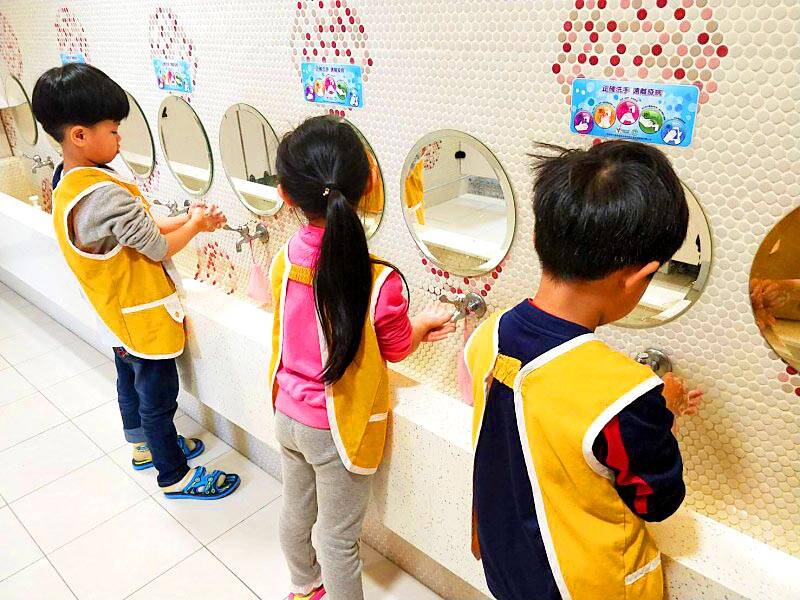Two cases of enterovirus 71 (EV71) were reported last week, the Centers for Disease Control (CDC) said yesterday, adding that it was a warning sign, as the virus has not been detected for more than a year.
Parents are advised to remind their children to practice good hand hygiene, it said.
Guo Hung-wei (郭宏偉), director of the CDC’s Epidemic Intelligence Center, said that 165,230 people visited a hospital for diarrhea last week, which is a high number.

Photo courtesy of the Taoyuan Department of Public Health
Most of the diarrhea case clusters were caused by norovirus infection, but there were also enterovirus cases, and weekly caseloads are slowly increasing, Guo said.
Most of last week’s enterovirus cases had Enterovirus D68 (EV-D68), but two young children in northern Taiwan had EV71, weekly enterovirus data showed.
One of the EV71 cases is a one-year-old boy who had a fever and fatigue, while the other is a four-year-old girl who had a fever, sore throat and mouth ulcers, CDC physician Lin Yung-ching (林詠青) said.
While their family members did not have symptoms, classmates at their nursery and preschool had enterovirus infections, Lin said.
“EV71 infection can cause nervous system complications, including encephalitis, meningitis and even acute flaccid paralysis,” he said.
Mild symptoms include herpangina (blister-like sores in the mouth and throat) and foot-and-mouth disease, Lin said, adding that the four-year-old girl’s ulcers were a typical symptom.
“There has been no enterovirus outbreak in the past three years, so many young children have never been infected with an enterovirus and do not have immunity, making cluster infections more likely,” he said.
Enteroviruses mainly spread through respiratory droplets and direct contact with contaminated objects, so parents should remind their children to wash their hands frequently and wear a mask if they have symptoms, Lin said.
People should seek medical attention if suspected symptoms occur and rest at home, he added.
CDC Deputy Director-General Philip Lo (羅一鈞) said the two EV71 cases are a warning sign, as the virus has not been detected in Taiwan for more than a year.
There have been large outbreaks in the past, and the virus can cause severe complications, so the CDC plans to tell healthcare facilities to be cautious and ask schools and parents to remind young children to practice good hand hygiene, he said.
Children aged five or under are at higher risk of severe complications, and parents should seek medical attention immediately if their children are persistently sleepy or repeatedly vomiting, or if they have concentration issues, fatigue, weakness of the limbs, myoclonic jerks, shortness of breath or a rapid heartbeat when their body temperature is normal, Lin said.
Meanwhile, three cases of severe flu complications were reported last week: one with the influenza A (H1N1) virus and two with the influenza A (H3N2) virus, Lin said, adding that they were all over the age of 50 and did not get vaccinated this flu season.
Separately, the Central Epidemic Command Center yesterday reported 9,860 new local COVID-19 cases, 225 imported cases and 28 deaths.
The local case count is 8.8 percent lower than it was on Tuesday last week, it said.

An essay competition jointly organized by a local writing society and a publisher affiliated with the Chinese Communist Party (CCP) might have contravened the Act Governing Relations Between the People of the Taiwan Area and the Mainland Area (臺灣地區與大陸地區人民關係條例), the Mainland Affairs Council (MAC) said on Thursday. “In this case, the partner organization is clearly an agency under the CCP’s Fujian Provincial Committee,” MAC Deputy Minister and spokesperson Liang Wen-chieh (梁文傑) said at a news briefing in Taipei. “It also involves bringing Taiwanese students to China with all-expenses-paid arrangements to attend award ceremonies and camps,” Liang said. Those two “characteristics” are typically sufficient

A magnitude 5.9 earthquake that struck about 33km off the coast of Hualien City was the "main shock" in a series of quakes in the area, with aftershocks expected over the next three days, the Central Weather Administration (CWA) said yesterday. Prior to the magnitude 5.9 quake shaking most of Taiwan at 6:53pm yesterday, six other earthquakes stronger than a magnitude of 4, starting with a magnitude 5.5 quake at 6:09pm, occurred in the area. CWA Seismological Center Director Wu Chien-fu (吳健富) confirmed that the quakes were all part of the same series and that the magnitude 5.5 temblor was

The Central Weather Administration has issued a heat alert for southeastern Taiwan, warning of temperatures as high as 36°C today, while alerting some coastal areas of strong winds later in the day. Kaohsiung’s Neimen District (內門) and Pingtung County’s Neipu Township (內埔) are under an orange heat alert, which warns of temperatures as high as 36°C for three consecutive days, the CWA said, citing southwest winds. The heat would also extend to Tainan’s Nansi (楠西) and Yujing (玉井) districts, as well as Pingtung’s Gaoshu (高樹), Yanpu (鹽埔) and Majia (瑪家) townships, it said, forecasting highs of up to 36°C in those areas

The brilliant blue waters, thick foliage and bucolic atmosphere on this seemingly idyllic archipelago deep in the Pacific Ocean belie the key role it now plays in a titanic geopolitical struggle. Palau is again on the front line as China, and the US and its allies prepare their forces in an intensifying contest for control over the Asia-Pacific region. The democratic nation of just 17,000 people hosts US-controlled airstrips and soon-to-be-completed radar installations that the US military describes as “critical” to monitoring vast swathes of water and airspace. It is also a key piece of the second island chain, a string of